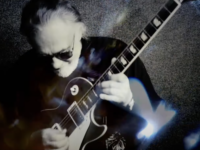Graham Parker, forefather of new wave Angry Young Men like Elvis Costello and Joe Jackson, always had a fervent, if small following. That’s the way it is with individualists, not to mention sharply critical ones.
In fact, Mercury originally pressed just 8,000 copies of Parker’s first best album, 1976’s Howlin’ Wind. Yet that thrilling blending of rock, ballads and reggae-influenced tracks would, nevertheless, be named one of the 100 best LPs of the last 20 years by Rolling Stone at the close of the 1980s. Then came The Mona Lisa’s Sister in 1988, one of his next best albums. Despite similarly limited distribution, and inaudible advance buzz, Graham Parker somehow hit the Top 100 on the Billboard charts.
Still, as Arista Records head Clive Davis once told Parker, more often the public was passively resisting him. I’m not sure it wasn’t the record labels themselves – a lot that so rarely seems to understand personal, much less angry, records – but that’s an entry for a different day.
Graham Parker squared off once again with Burning Questions, an album of uncommon intelligence that featured a naked lady on the front. He beseeches, he rails; he’s not afraid to yell. And yeah, he pleasantly recalls that early period with his old band the Rumour, right down to the album title – similar to Graham Parker’s early signature tune Don’t Ask Me Questions, which hit the top 40 in his native UK.
By the time Burning Questions arrived on July 20, 1992, Graham Parker had put out 15 records, and I’m happy to report that Parker never lost that flat-footed stance – or, for that matter, his burning questions. He doesn’t stir in any horn-inflected soul (something that helped move what few records he once sold), instead staying with a sound more in keeping with the tough, post-punk stuff Parker began doing with the now-legendary Squeezing Out Sparks.
Stripped down and muscular, Burning Questions showed Graham Parker was still angry, if no longer such a young man. Time hadn’t dulled his wit, or his inquisitiveness. And sales be damned. Think of it, and not for the first time, as Parker’s way of saying that he’ll make thoughtful records, but his way. Even if, again, few people – beyond me and the guys at Rolling Stone, I suppose – were listening.
- The Bright Spots in George Harrison’s Troubled ‘Dark Horse’ Era - December 29, 2024
- The Pink Floyd Deep Cut That Perfectly Encapsulates ‘The Wall’ - November 29, 2024
- Why Pink Floyd’s ‘The Endless River’ Provided a Perfect Ending - November 11, 2024


